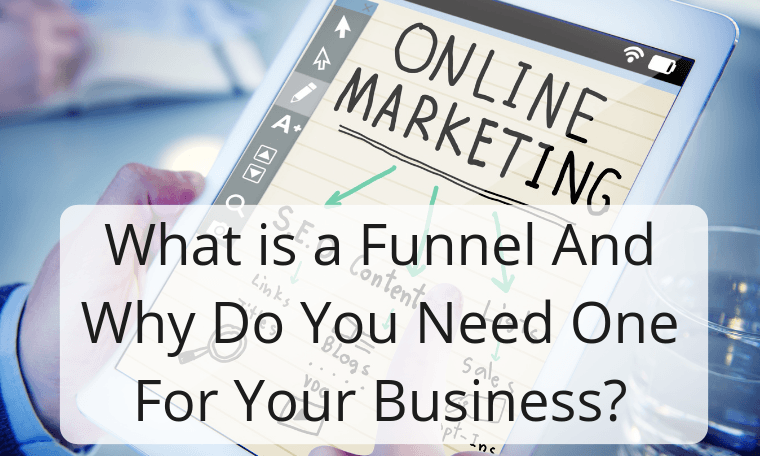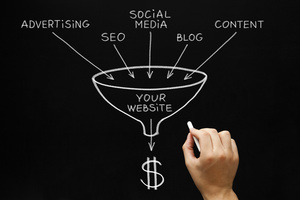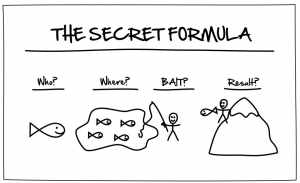
What is a Funnel And Why Do You Need One For Your Business?
While talking to other entrepreneurs what their biggest challenge about digital marketing is I usually get two different answers:
- “I’m asking myself how I can get more customers from the internet. There are so many strategies and I don’t know which is right for me.”
- “How should I have time for Facebook, a blog, …?”
I can understand that.
How about you?
In this article, I want to show you a proven strategy on how you can save a lot of time by automating your processes and how to get more ideal customers for your business.
With a funnel.
Your website is one of your employees and it has to do a certain job to do.
I’m pretty sure that every entrepreneur needs at least one sales funnel.
What is a funnel?
I’m pretty sure you know a funnel you can use in the kitchen.
A funnel has a big entrance and a much smaller exit.
The word funnel can be a little confusing when it’s used in the online marketing space because not everything what is entering our funnel on the top is exiting our funnel on the bottom. You can rather see your funnel as a filter.

We are using this funnel to get from a huge amount of visitors (huge entrance) to a smaller amount of people who are interested in our product or customers (small exit).
What kind of funnels are there?
If you listen to people talking about funnels they are usually talking about three different categories:
- sales funnel
- marketing funnel
- conversion funnel
However, all these funnels are the same.
Usually, the marketing takes place before a sale so you can split them into two different funnels. But the goal of both funnels is a conversion.
A conversion can be filling out a form or a sale.
Conversion: A conversion is the transformation of a status. For example, a lead converts into a customer.
In this context the conversion rate is important. The conversion rate describes the number of people who took a specific action in percent. When 100 visitors on our website convert into 5 customers we have a conversion rate of 5%.
Example funnel for coaches and consultants
Let’s have a look at a funnel and how it can help us attract new customers. The following drawing is an example funnel for coaches and consultants:

Let’s have a look at the elements
- The funnel starts an ad (AD) that people click on. The ad can be on Facebook or Google for example.
- The person clicking on the ad comes to our landing page (LP) where they can enter their email to get something for free (pdf report, free training, etc.)
- After entering their email address the visitor comes to our thank you page (TP) with contains a video and a button. In the video, you solve a problem of your visitor and they can apply for a free strategy coaching by clicking on the button.
- If they click the button (Yes) they come to a questionnaire (questions) where they have to answer important questions for the strategy call.
- After finishing the questions they come to a calendar (calendar) to choose a date for the call.
- The strategy call (call) takes place and hopefully…
- You get a sale of your coaching/consulting product (sale)
If the visitor visiting the thank you page doesn’t click on the button (No) they get an automated email sequence where you give them valuable content and build up trust.
The goal of the email sequence is to get them answering the questionnaire and get them on the phone with you.
In this example, we have an ad, which points directly to our landing page. Instead of an ad, we can also have other starting points, like:
- an email list
- a blog article
- social media post
- YouTube Video
Why do I need a funnel?
Summarized in two points:
- Processes can be automated. Instead of sending out emails manually you can automate the whole process with only one tool.
- With a funnel, you can build up trust and show people why you are an expert in your field (higher conversions)
Before you build your first funnel, you need to ask yourself some questions:
The 4-questions of a funnel

- WHO: Who is your ideal customer?
- WHERE: Where is your ideal customer?
- BAIT: Which bait can attract your customer?
- RESULT: Which solution are you offering him?
Who?
Before you start building a funnel you need to know your ideal customer.
What interests does your ideal customer have? How old are they? What kind of job do they have?
The better you know your ideal customer the better you can speak their language and attract them into your funnel.
Where?
Where does your ideal customer spend their time online? Is it on Facebook? Is it on Instagram? Is it in online forums? What blogs, magazines or newspaper are they reading?
Bait?
What problem can you save with your bait? You bait can be resources, a case study or a checklist.
Result?
How can you solve the problem of your ideal customer?
It’s not about which product you can sell them but rather which result they will get with your product.
If you have a solution to their problem the price is not as important anymore.
Which tools and elements do I need for a funnel?
Depending on your industry and your goal your funnel can look different.
However, these are the elements you (almost) need every time:
- Email-Marketing Software – Your email marketing software should be able to build up automations based on the behavior of your visitor (Did they click on the button or not)
- Landing Page Software – A tool that helps you creating high-converting landing pages.
- Lead Magnet – You need some kind of gift for your visitor so they exchange their email address.
An element which can be also very effective:
- Webinars – Possibility to do webinars (automated or manually)
Which tool should you use?
For each element in your funnel, there are many tools you can use. However, I would recommend using one tool for all elements. I can recommend ClickFunnels which is a sales funnel builder tool. ClickFunnels comes with an easy to use landing page creator, powerful email marketing automation and everything you need for your funnel (webinars, sales pages, affiliate program etc. The greatest thing about ClickFunnels? You can test ClickFunnels for free for 14 days. Click here to start your free trial!
I’m using ClickFunnels for over 3 years now and I never have been more amazed by a single online marketing tool!
Conclusion
As you can see, a funnel is a perfect chance to have a system which brings you new customers, fully automated. Your sales funnel works 24/7 and never needs a pause or vacation.
However, building a converting funnel is a long-term strategy.
You need to test and optimize the different elements of your funnel to get the best results possible.
Maybe you don’t have the perfect lead magnet at the beginning or your follow-up sequence isn’t working as supposed. That’s part of your work.
That’s why you should always have a look at your ideal customer and ask yourself the four questions (Who, Where, Bait, Result).
If you keep improving your funnel step by step you’ll get the results you want to have.
About the Author Fabi
While I was in college I was not amused to become a 9-5 worker. So I searched for other ways. And I found online marketing. After many failures, I finally succeeded and I was able to escape the 9-5 and live the life I always wanted. I believe that if you want something you can achieve it. And if you want to build a successful online business I can help you achieve your goal!

